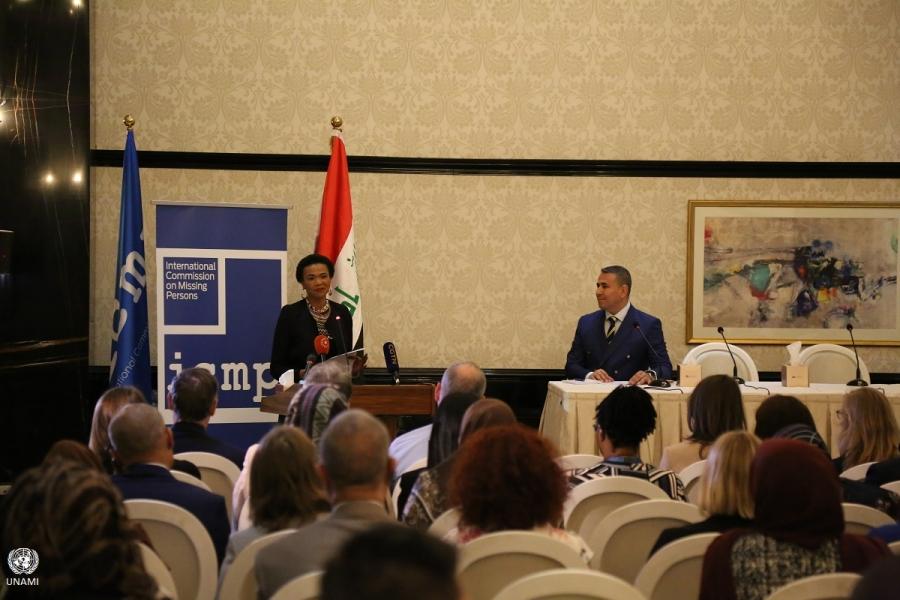The International Commission on Missing Persons Conference on “Missing Persons in Iraq and the Impact on Women, Peace and Security”
Remarks by Ms. Nono Mmabatlharo Dihemo, Gender Advisor, UNAMI

at the International Commission on Missing Persons Conference on “Missing Persons in Iraq and the Impact on Women, Peace and Security”
2 May 2018, Babylon Hotel, Baghdad, Iraq
Excellencies, Honourable Ministers, Distinguished Guests, and Civil Society,
All protocols observed
Salaam Aleykum!
I am here today to talk about a priority and urgent issue– Missing Persons in Iraq and the impact on their families, notably on women and girls. Let me begin by acknowledging the pain and suffering of families who continue to search for their loved ones. The United Nations stands with these families and reiterates its commitment to engage with all relevant stakeholders to ensure this issue remains a priority. The role of women is critical to advancing reconciliation, accountability and long-lasting peace in Iraq.
Distinguished guests,
I will focus briefly on the international legal framework that recognizes the gendered impact of conflict and the critical role of women in conflict prevention and peacebuilding efforts, namely UN Security Council Resolution 1325 (often referred to as the women, peace and security agenda).
1325 recognizes that conflict affects women and men differently, and that women have critical roles to play in peace and security processes. 1325 also calls for the participation of women at all levels of decision-making in conflict prevention and resolution, in peacekeeping and peacebuilding efforts; the protection and promotion of women’s rights, including ensuring justice and accountability systems are gender sensitive, the prevention of sexual and gender-based violence (SGBV), and provision of services for survivors.
Distinguished guests,
It is an internationally accepted norm that a gender-blind understanding of conflict significantly undermines international peace and security efforts. It is therefore our common obligation to ensure that conflict prevention and peacebuilding activities are properly informed by an analysis of the impact of conflict on women and that we take all steps to ensure women’s inclusion in these activities.
To date, little attention has been given to the impact of missing persons on women, specifically, and on their role in ensuring peace and security in Iraq.
Reportedly, the majority of those who have disappeared in Iraq are male, due to the nature of previous armed conflicts, leaving a disproportionate number of female-headed households. Female-headed households who often face particular risks linked to the psychosocial, socio-economic, cultural and political consequences of the disappearance of their husbands or fathers. In addition, women whose male relatives have gone missing face particular harsh legal, social and economic vulnerabilities without the traditional “protection” of the male head of household; They are at greater risk of displacement and sexual exploitation or violence; their children are at greater risk of child labor, early marriage and radicalization.
Relatives of the missing have a right to official efforts that can establish the truth. Healing and closure can only come with the truth. Moreover, the State has an obligation to provide the necessary support to the families of the missing, without discrimination. The families of missing persons have the right to be represented in decision-making in various post-conflict justice mechanisms such as the Missing Persons, and other institutions.
Distinguished guests.
Iraq is the first country in the MENA region to adopt a National Action Plan on UNSCR 1325. We acknowledge the efforts of the Cross-Sector Task Force (respective ministries) as well as Civil Society in the implementation of the 2014-2018 plan. Some elements of the plan still require implementation, for example, the participation pillar. Currently, consultations with civil society are ongoing on drafting emergency Governorate plans to address the immediate needs of communities for Ninewa (including Mosul) and Anbar. Baghdad, Basra and Diyala Governorate Plans have been adopted. The necessary budgetary allocation is still required to implement the plans.
The UN Family continues to support the Iraqi Government to implement the National Action Plan, in different programmatic areas, including advocacy and technical assistance. The next National Action Plan is expected to be adopted and implemented in 2019. It is our hope that it will have a budget and the next government will prioritize establishing a women machinery or Commission to advance the women, peace and security agenda.
The National Action Plan does address the issue of female heads of household in a patriarchal society and the feminization of poverty as a result of the death or disappearance of men during armed conflict.
Distinguished guests, we should not forget also, the missing women, girls, men and boys due to the conflict with ISIL. In most instances, even when the missing person is presumed to be dead, the process for surviving women to access legal documentation, property rights, administrative rights, inheritance, custody, and compensation is hindered by both legal and practical obstacles.
Though Iraq is slowly emerging from the nightmare of ISIL, but there can be no closure or healing without identifying the fate of missing persons in Iraq and providing the necessary support to their families and loved ones
Addressing the concerns of missing persons contributes to peace and to building an inclusive society in which rights are upheld and trust is restored between communities and institutions.
In closing, UNAMI strongly encourages government authorities, in particular the Ministries of Justice, Interior, Defense, and Health and the Martyrs’ Foundation, to develop a unified process to locate and identify the missing, and fulfill the rights of surviving families, in particular, surviving women. The UN family remains at your disposal to support a centralized unified structure to address missing persons concerns.
END

